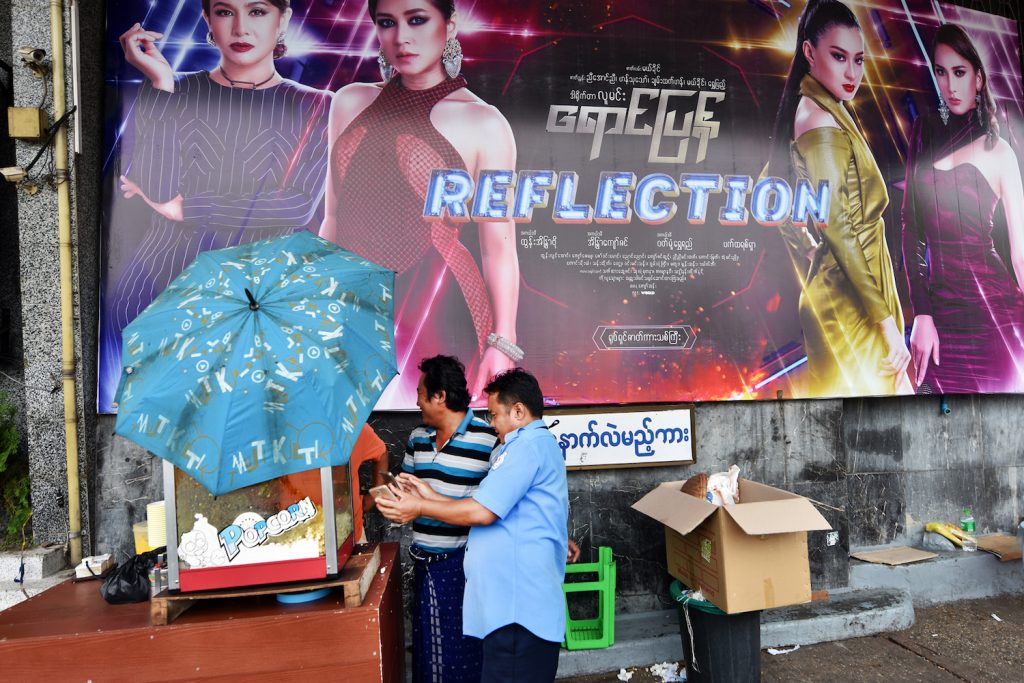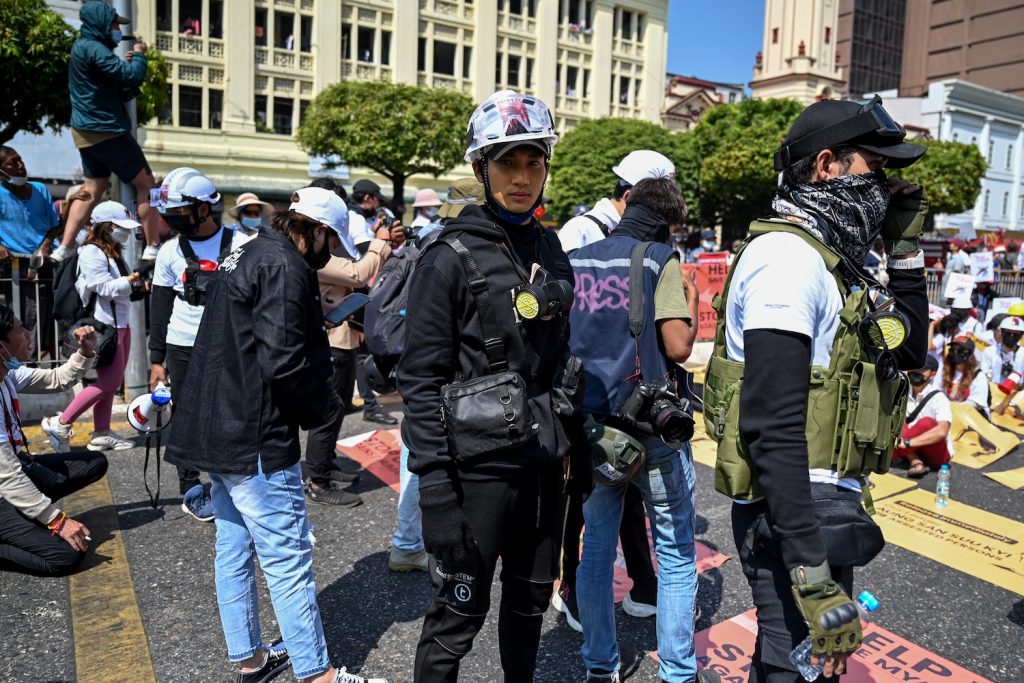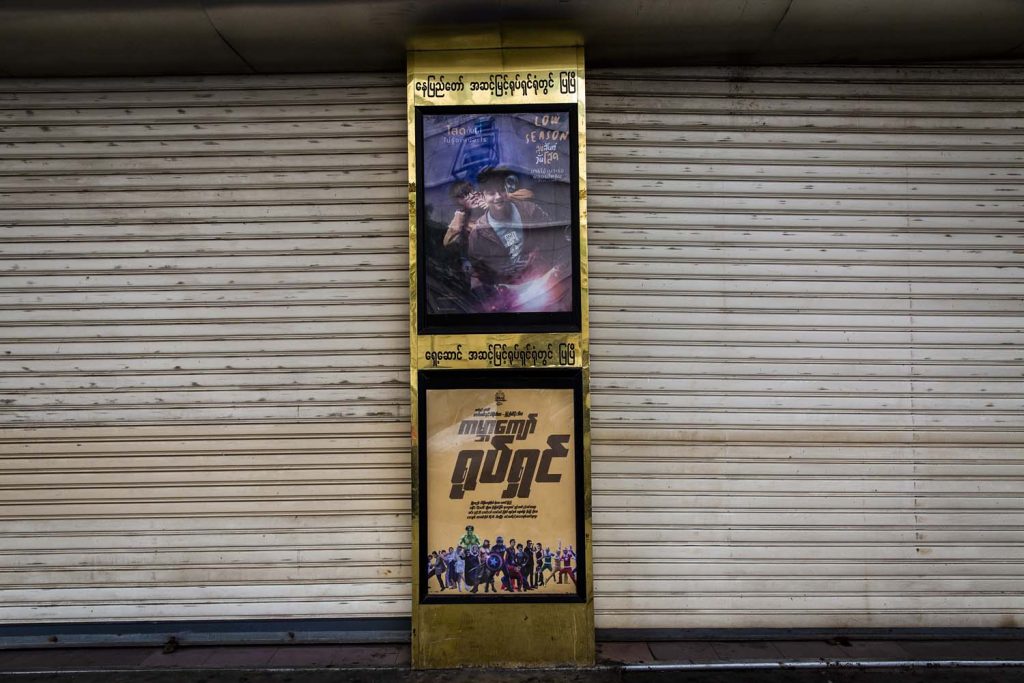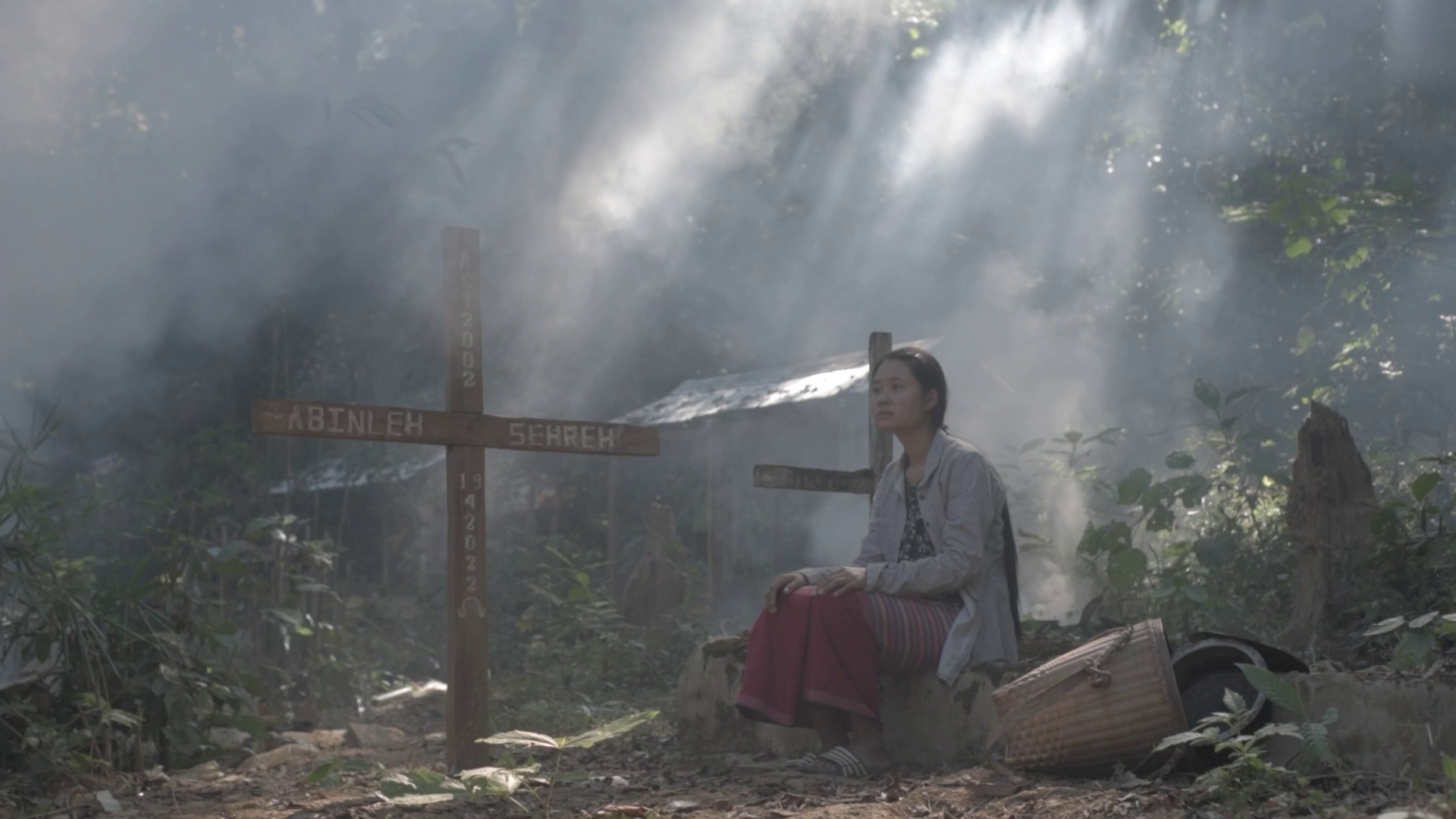The coup is worsening the long-standing tendency to judge cultural output – and film in particular – based on moral convictions.
By SAR PHYU | FRONTIER
A dictator’s influence lasts longer in the minds of its subjects than the imprint of a boot in wet cement. The marks may be less visible than a scarred sidewalk, but one place they can be seen clearly is in a nation’s cultural production, particularly cinema – where the minds of creatives meet popular audiences. Here, it’s possible to trace even the subtlest scars on the body politic.
Prior to February 1, 2021, decades of military rule had already ravaged Myanmar’s film industry; since the coup, the wounds have only accrued.
When the National League for Democracy government ordered cinemas across the country to close in March 2020 due to the pandemic – a decision that plunged the entire film industry into stasis – they had been promoting the gun-wielding gangster flick Original Gangster 3 as their next feature.
The junta, though, had other ideas. When it forced about 70 cinemas to reopen on April 17, it instead handpicked the romance Way Ma Nay Chin Bu (“I Don’t Want to Be Away From You”) for top billing.
(The lack of cinema screens in Myanmar means many films have to wait years for release, and this was exacerbated by the COVID-19 shutdown; Way Ma Nay Chin Bu, for example, was produced in 2017.)
The new romance – and the cinemas reopening more broadly – is an attempt to distract attention from the junta’s freewheeling atrocities. If social media reaction and ticket sales are anything to go by, the people have quickly seen through this ploy. No amount of light entertainment will suture the bullet holes borne into the bodies of anti-coup protesters over the past 16 months.
Less than two weeks after cinemas reopened, the regime offered up a timely reminder that cinema is not just a propaganda tool when it sentenced producer Ma Aeint to three years in prison with hard labour.
Charged last year with a slew of anti-free speech offences for criticising the regime, Ma Aeint was detained on June 5, 2021. During her interrogation, she was beaten so badly she suffered memory loss, The Irrawaddy reported. While she languishes in prison, her critically acclaimed Money Has Four Legs, which she co-wrote and produced, continues to win plaudits on the international film festival circuit.
Other film industry professionals were also on the frontlines of anti-coup protests last year, and weathered the bloodshed when crackdowns turned fatal. Many posted anti-coup material on social media, and were subsequently included on public wanted lists that the regime published daily in state newspapers through April and May 2021. They are now in jails, in jungles with armed resistance fighters, or in exile, such as the actress Paing Phyo Thu and her filmmaker husband Na Gyi.
The celebrities who have supported the resistance have not only disappeared from Myanmar’s cinema screens, they’re also persona non grata on free-to-air broadcasts, including advertisements. At the height of bloody regime crackdowns in late April 2021, cosmetics brand Pond’s quietly removed Phway Phway – who had been included on a public wanted list of anti-coup celebrities – from its new ad campaign. To keep its marketing blitz rolling, she was replaced with a Thai actor, whose voice was dubbed in Burmese.

Purity tests
For the military, the cultural industries are a threat to be managed. But while it recognises the power of art to inspire, it also knows that the flame of art can never be extinguished, not completely, and so it also tries to co-opt – or coerce – the cultural industries into its political designs, however cringe-inducing the results (see: Way Ma Nay Chin Bu).
In the regime’s imagining, nothing will convince the world all is well in Myanmar like packed cinemas and well-attended art showings. And under previous iterations of military rule, this worked to some extent; cinemas were often full for the opening of the latest slapstick comedy or over-acted romance.
This time, however, its plan has failed: citizens are boycotting cinemas, along with actors and filmmakers deemed to be pro-military. Only three people turned up over three days to a recent screening of Way Ma Nay Chin Bu, according to People’s Spring, a resistance newsletter. Some 60 of the 70 cinemas that reopened have soon closed due to lack of customers, according to media reports – just another example of the country’s disgust with the junta and its supporters. Whereas it used to be a commentary on the low-quality of Myanmar cinema when people would say, “I don’t watch Burmese movies”, it has today become a moral declaration.
Those who dance to the regime’s tune are condemned to a similar fate. Most will never buy a ticket to see the likes of Yone Lay (Little Rabbit), a vocal supporter of the military and lead in Original Gangster 3. His reputation has been shot since the release of his notorious pre-coup single, “The Land of Ours (Time to Unite Myanmar)”, in which he offers up lines such as, “Would a country be safe without an army?” In the video, a stand-in for soon-to-be coup-maker Senior General Min Aung Hlaing rushes onto screen to rescue a Daw Aung San Suu Kyi figure facing an assassin’s bullet.
It was widely panned at the time, but six months later it began to look more like a sick joke. Rather than saving a threatened Aung San Suu Kyi, the real Min Aung Hlaing was stealing power and detaining her on a barrage of absurd charges in an attempt to end her political career.
The coup has generated such anger that if the junta deems an actor or filmmaker morally acceptable – even if by remaining silent about its assault on democracy and the most basic human rights – that artist will never be seen as dignified in the public eye. This is not just the case with the usual suspects, like Yone Lay, though. Consider the talented Myint Myat, an award-winning actor who despite his accolades has been widely slandered since claiming in the wake of the coup to be “neither interested in politics nor (to) understand it”.
This is not an entirely new phenomenon. The older generation of film industry professionals laboured under dictatorship for more years than they did under civilian leadership. Artists like Lu Min, Eaindra Kyaw Zin and Pyay Ti Oo have been forgiven their past sins after speaking out against the coup, as have younger actors like Min Maw Kun, who also has credits in propaganda films and has since joined the resistance.
But the questions don’t go away. Were these actors’ past collaborations with the military done out of coercion or out of political convictions? It is difficult to say. Similarly, was it a calculated move to join Aung San Suu Kyi’s 2015 election campaign – which would have been bland without their star power – or did they finally see the light of democracy? In the end, film is an industry like any other, and its participants’ decisions are often as much a mix of art and aesthetics as they are of money, power and personal security. No one can claim to be entirely pure.

Censoring ourselves
On April 7, Min Maw Kun launched an expletive-laden Facebook post – his favoured means of keeping the flame of revolution ablaze from the jungle – to all artists he saw as normalising the junta by returning to commercial film work. This was undoubtedly a veiled call-out of Paing Takhon, the 24-year-old model who was initially jailed for speaking out against the coup, but since his release has posted a succession of glamour shots on social media, as if all were right in the world.
After Min Maw Kun’s Facebook post, Paing Takhon quickly cancelled all of his previously scheduled events – in sympathy, he said, with the people of Myanmar. While Min Maw Kun was just as quick to note that he had not named anyone in his original post, the effect has been that one’s opinion of Paing Takhon is now taken as proof of their moral righteousness. The world is split now into good and evil: those who seem contented with, or at least resigned to, the status quo oppression and those fighting against it.
To be sure, the images of supermodels and star actors living happily under military dictatorship are vexing to those fighting against it. On the flip side, taking an obvious political stand on social media to support the resistance should not be a free ticket to critical artistic success.
This is the damage that a history of political crises has done to Myanmar: it has created a culture beholden to cults of personality and the blind worship of supposed saviours. We should not forget that at the National University of Arts and Culture – the only university in Myanmar offering degrees in filmmaking, and administered by the Ministry of Religious Affairs and Culture – a large banner declares its motto, “A mind when tamed is conducive to happiness”, a constant if subconscious reminder to self-censor.
But let us also not forget the role that alleged moral purity tests have always played in censoring art in Myanmar. The high and mighty old guard censors regard themselves as the arbiters of what is morally good and appropriate, and justify redacting anything they deem unsightly from films based on this supposed moral righteousness. It is a particularly painful irony to watch how quickly democracy activists sometimes assign good and bad labels to entertainers in the same way that generations of dictators have before them. Prior to the coup, the #RatingSystemNow campaign – which sought to replace censorship with an age-appropriate-based rating system – had the potential to send the old guard censors into retirement. Let’s not continue their work for them.
False prophets
For too long the people of Myanmar have fallen prey to the moral simplicity of false prophets, in art as in politics: behold the proliferation of Aung San Suu Kyi and Bogyoke Aung San complexes throughout the culture. Yet even Min Aung Hlaing, who has committed war crimes that plausibly include genocide, likely believes he is doing good. So much good, in fact, that he recently bestowed upon himself the country’s two highest titles of merit: the Sadoe Thiri Thudhamma and the Sadoe Maha Thray Sithu.
Yet rather than laugh (or cry) over the merits and honours conferred by the military on itself and the artists who back it, we would be better served by instead challenging the mythologies we’ve built around our own heroes. Could we ever objectively critique, say, the films of director Win Pe, lauded as “the master of all art forms”, or the works of filmmaker Christina Kyi, who with her actor-husband Zenn Kyi, was seen prior to the coup as the saviour of Myanmar’s dying film industry?
In the eyes of many, the re-closure of nearly all cinemas is a convincing victory for the virtuous people and yet another sign that the finish line is drawing nearer for the revolution. Although the blood-soaked memories of the past year and a half will not soon be forgotten, we should also recognise that the line between hero and villain is blurry and constantly shifting. Eventually, actors and filmmakers on both sides of the political divide will probably one day work together again.
Myanmar’s film industry needs a revolution of a different kind: one in which art is judged on its merits, rather than the moral righteousness of its creators. Until that happens, the modernisation of its film industry will still be a long way off.
Sar Phyu is a Myanmar writer living in Yangon who has covered art, film and popular culture for Frontier and other outlets







